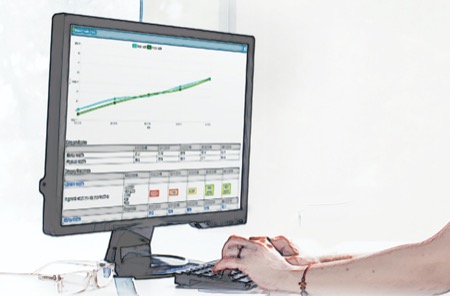CHICAGO—A monitoring device passively and accurately detects flares of Crohn’s disease before clinical signs appear, according to a study of more than 100 individuals monitored for up to a year.
The device—which stays at home and is not worn by the patient—measures biomarkers remotely with a sensor as the patient performs normal activities. Collecting data on the patient’s changes in sleep, gait and respiration, the device then employs machine learning to detect the difference between remission and flare, reported investigator Joshua Korzenik, MD, an associate professor of gastroenterology at Brigham and Women’s Hospital and Harvard Medical School, in Boston.
“It is passive, touchless monitoring that can identify flares and remission with accuracy that approaches that of fecal calprotectin [FCP],” explained Dr. Korzenik, who presented his data at Digestive Disease Week 2023 (abstract 354).
The sensor is built on the proprietary Emerald platform, which has been developed for sensing and measuring biomarkers for health analytics. Employing radio waves, the sensor is about the size of a book and can sit on a shelf or be mounted on a wall in the patient’s home.
The device was tested in 105 individuals, of whom 26 were healthy controls. Of the 79 patients with Crohn’s disease, 44 were in remission and 35 had active disease at the time of study enrollment. Most of those with Crohn’s disease (83%) were taking biologics. The groups were matched with respect to age (mean, 47 years) and sex. Confounding chronic diseases that affect respiration or gait, such as heart failure, were exclusion criteria. Participants wore an ankle bracelet at the start of monitoring so the sensor could be easily taught how to distinguish them from housemates.
Over the study period, the change in disease activity was evaluated on an every-six-week basis. A FCP level of at least 120 mcg/mg was considered a signal of active disease. Disease activity was monitored with a PROMIS (Patient Reported Outcomes Measurement Information System) questionnaire and with any data collected in the course of management, such as imaging, endoscopic evaluation or inflammatory biomarkers.
Data on Sleep, Gait, Respiration
Over a mean monitoring period of 297 days, a large data set was generated. It included nearly 25,000 nights of sleep and 200,000 hours of gait and an even larger body of data on respiration.
Compared with FCP and other measures of activity, such as patient-reported outcomes, “the sensor predicted disease flare accurately with an area under the curve of 0.80,” Dr. Korzenik reported.
An impending flare correlated with an increase in breathing rate, a modest reduction in gait speed and several types of changes in sleep quality, such as increased awakenings, greater amounts of deep sleep, and lower amounts of rapid eye movement sleep. Changes in sleep quality and respiration rate were particularly sensitive predictors of flare, he said.
Life stresses did not appear to impede the prediction of flares, but Dr. Korzenik did acknowledge that pets are a potential confounder. “We had to exclude individuals with larger dogs that slept in the same bed.”
Prospective Data Needed
The next step is to determine whether this information can be applied to optimize care. The fact that the sensor can identify preclinical signs of flare is encouraging. “In many cases, disease flares were detected 20 days or more before they were clinically apparent,” he said.
The accuracy of the device drew the attention of several inflammatory bowel disease experts, including Ryan Ungaro, MD, an associate professor in the Division of Gastroenterology at the Icahn School of Medicine at Mount Sinai, in New York City. “I think this technology is very intriguing and could potentially decrease the frequency and severity of flares if treatment can be adjusted more proactively,” he said. “However, early flare detection, even if the accuracy seen in this study is confirmed in larger trials, is not enough. “I do think that such a strategy of altering therapy in response to remote passive device monitoring will then require testing in a prospective trial to understand its impact on clinical outcomes.”
—Ted Bosworth
Dr. Korzenik reported financial relationships with Bilayer Therapeutics, ClostraBio, Colonary Concepts, Corevitas, Promakos, SuonoBio and Thetis. Dr. Ungaro reported financial relationships with AbbVie, Bristol Myers Squibb, Janssen, Pfizer and Takeda.
{RELATED-HORIZONTAL}
